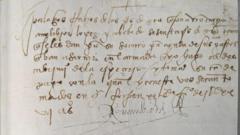The FBI has marked a significant step in cultural restitution by returning a historic document signed by Spanish conquistador Hernán Cortés to Mexico. The artifact, a manuscript page attributed to 1527, is part of a larger collection believed to have been stolen from Mexico's national archives at some point between 1985 and 1993.
This page outlines financial transactions related to supplies for expeditions, providing invaluable insight into the early colonial endeavors in what would be known as New Spain. Cortés played a crucial role in the downfall of the Aztec empire, paving the way for Spanish colonization across the Americas.
After verifying its provenance, the FBI’s art crime team facilitated the document’s repatriation, with Mexican authorities having initiated the recovery process in 2024. Initial investigation efforts revealed that the document had been catalogued with a wax number in the mid-1980s but went missing by 1993.
While the FBI has not disclosed the exact location where the manuscript was found or its ownership history, Special Agent Jessica Dittmer emphasized the importance of such artifacts as protected cultural property. "This document gives significant context about the preparations made for exploration in uncharted territories of that time," she stated.
The repatriation is particularly poignant against a backdrop of ongoing political tensions between Mexico and the United States, illustrated by disputes over tariffs and immigration. Nonetheless, the FBI asserts its commitment to combat the trafficking of antiquities as part of its responsibilities.
The focus on heritage preservation continues, as the FBI has additional efforts underway to locate the remaining missing pages from the Cortés collection. This is not the first time a document linked to the explorer has been returned; another was repatriated to Mexico by the FBI in 2023. As the dialogue on cultural restitution evolves, efforts like these highlight a growing recognition of historical accountability and collaboration.



















